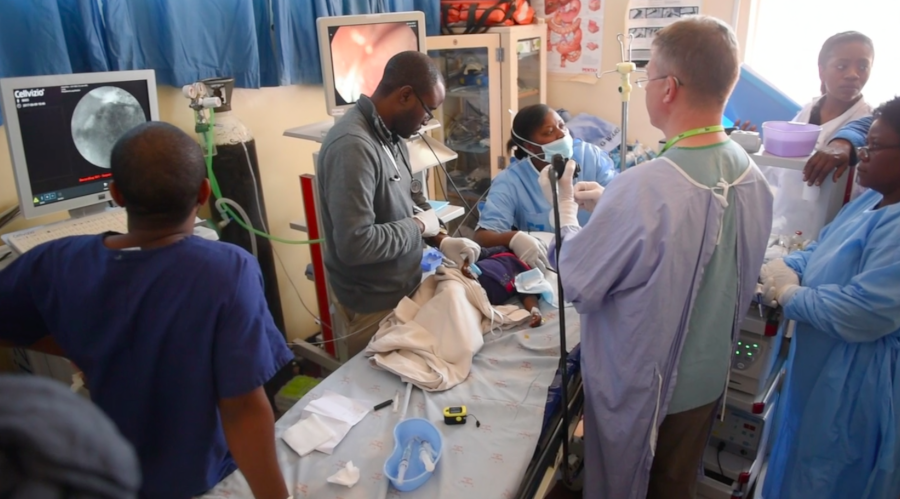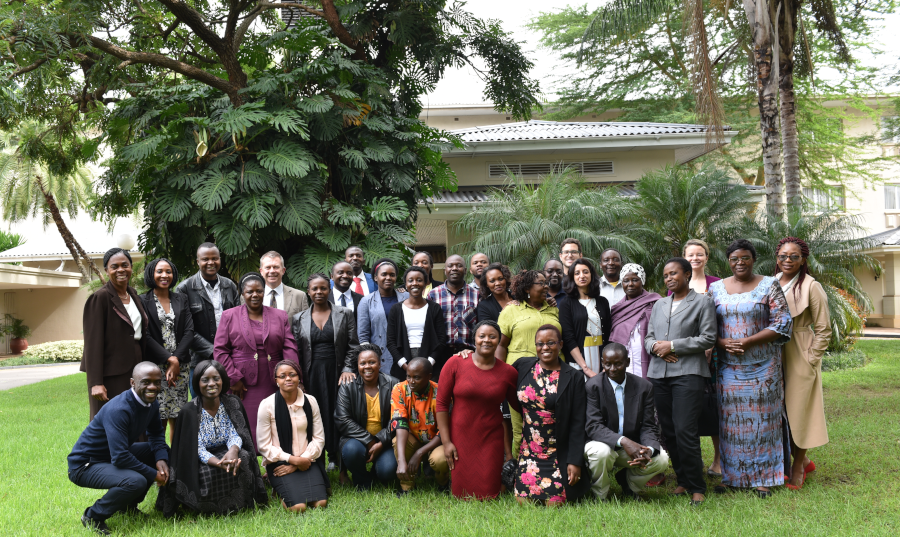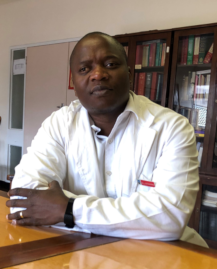???????????The? African Microbiome Institute (AMI)???
?
International Collabora?tors
中国体育彩票 of Pittsburgh, US?A
Prof O’Keefe’s Lab: Research in Nutritional Gastroenterology (RING group)
The lab Manager is Annette Wilson PhD, current post-docs Soren Ocvirk from Germany, John Onuh from Nigeria, and Caixia Chen from China. The lab is focused on the targeted analysis of the microbiome and its metabolites, and their relationship with colonic mucosal biomarkers of cancer risk. Prof O’Keefe is also a member of the Executive Board of the Center for Medicine and the Microbiome, whose labs are adjacent in the same area.
 S?ren Ocvirk, PhD
S?ren Ocvirk, PhDPostdoc at RING in Pittsburgh and Department of Gastrointestinal Microbiology, German Institute of Human Nutrition Potsdam-Rehbruecke (DIfE), Germany
The risk of colorectal cancer (CRC) is predominantly driven by interactions of diet, the intestinal microbiota and the host. We study how microbial metabolites confer tumor-suppressive or tumor–promoting activities on the colonic epithelium and how this is modulated by diet. Specifically, we use gnotobiotic mouse models of CRC to investigate the impact of microbiota-dependent metabolites on colonic tumor formation and markers associated with CRC risk. This is complemented by in vitro experiments (e.g., intestinal organoids) to identify novel mechanistic links that represent promising targets with regard to CRC prevention.
The Center for Medicine and the Microbiome
The 中国体育彩票 of Pittsburgh/UPMC Center for Medicine & the Microbiome (CMM) was launched in May 2016 and maintains a mission to perform innovative basic, translational, and clinical research to understand the role of the microbiome in health and disease and to apply this knowledge to develop novel diagnostic and treatment strategies.

 Co-Directors are
Alison Morris MD, Head of Pulmonary Medicine, and
Barbara Methe PhD. The Center also serves as a nexus for intellectual and technical resources for investigators performing microbiome research to facilitate the translation of basic discoveries to clinical care. Important to the CMM’s mission is to establish a scientific community of microbiome researchers to enable collaborative projects, perform cutting-edge research, and increase funded microbiome research.
Co-Directors are
Alison Morris MD, Head of Pulmonary Medicine, and
Barbara Methe PhD. The Center also serves as a nexus for intellectual and technical resources for investigators performing microbiome research to facilitate the translation of basic discoveries to clinical care. Important to the CMM’s mission is to establish a scientific community of microbiome researchers to enable collaborative projects, perform cutting-edge research, and increase funded microbiome research. To that end, the CMM has established programs emphasizing technological capabilities in sequencing, bioinformatics and analytics, clinical study design, therapeutics and fecal transplants, host immune response and metabolomics and is opening a technical program in the use of gnotobiotic mouse models in early 2019. Focus programs currently emphasizing expertise in the microbiome in biological contexts include but are not limited to microbiome studies of the lung, oral cavity and gut as well as the relationship of the microbiome to intensive care, antibiotic resistance, immunocompromised patients and pediatrics and geriatrics. Another important component to the CMM’s mission is to grow a vital education and outreach program to aid investigators in better understanding the microbiome and how to conduct studies in this area that can contribute to their own research. Currently, these efforts include a seminar series and and opportunities to develop pilot projects. At present, the CMM has already engaged over 100 potential investigators from a wide range of science.
Imperial College, London
 James Kinross is a Senior Lecturer in Surgery at Imperial College London. He is a practicing colorectal surgeon and his research interest is in translational microbiome research. Imperial College hosts the Imperial Phenome Centre, which has developed analytical pipelines for conducting metabolic phenotyping on cohorts of samples from epidemiological studies to assess metabolic biomarkers of disease risk in populations1. The centre was founded with 21 Waters and Thermo Scientific LC-MS spectrometers, two Bruker 600 MHz NMR spectrometers, liquid handling robots and high specification computational infrastructure. It undertakes highthroughput metabolic phenotyping of plasma, serum, urine and other biofluids generated from epidemiological studies on behalf of researchers, to generate quantitative or semi-quantitative information on thousands of metabolites with a view to characterising the exposome (effect of nutrients, drugs, additives, pollutant exposure, gut microbiome etc.) and to generate deep metabolic phenotypes of diseases such as cardiovascular disease, metabolic syndrome, cancers etc. Building on strategic alliances the MRC-NIHR NPC has received substantial additional funding, equipment and know-how from industrial partners including manufacturers of nuclear magnetic resonance (NMR) spectroscopy (Bruker Biospin) and MS technology (Waters Corporation), placing it, and the UK, at the international forefront of metabolic phenotyping research. Imperial also hosts the Clinical Phenome Centre, which is designed to perform translational research and to develop point of care testing.
James Kinross is a Senior Lecturer in Surgery at Imperial College London. He is a practicing colorectal surgeon and his research interest is in translational microbiome research. Imperial College hosts the Imperial Phenome Centre, which has developed analytical pipelines for conducting metabolic phenotyping on cohorts of samples from epidemiological studies to assess metabolic biomarkers of disease risk in populations1. The centre was founded with 21 Waters and Thermo Scientific LC-MS spectrometers, two Bruker 600 MHz NMR spectrometers, liquid handling robots and high specification computational infrastructure. It undertakes highthroughput metabolic phenotyping of plasma, serum, urine and other biofluids generated from epidemiological studies on behalf of researchers, to generate quantitative or semi-quantitative information on thousands of metabolites with a view to characterising the exposome (effect of nutrients, drugs, additives, pollutant exposure, gut microbiome etc.) and to generate deep metabolic phenotypes of diseases such as cardiovascular disease, metabolic syndrome, cancers etc. Building on strategic alliances the MRC-NIHR NPC has received substantial additional funding, equipment and know-how from industrial partners including manufacturers of nuclear magnetic resonance (NMR) spectroscopy (Bruker Biospin) and MS technology (Waters Corporation), placing it, and the UK, at the international forefront of metabolic phenotyping research. Imperial also hosts the Clinical Phenome Centre, which is designed to perform translational research and to develop point of care testing.Prof Paul Kelly, TROPGAN resources and facilities (LUSAKA), 中国体育彩票 of Zambia and the ?Blizzard Center, St Batholomew’s Hospital, London
TROPGAN is a research group based in the Department of Internal Medicine at the 中国体育彩票 Teaching Hospital (UTH), Lusaka. Our research is focused on gastroenterology problems relevant to Zambia, in adults and children. Areas of focus include the interaction between enteropathy and malnutrition, upper GI cancers, hepatitis B, cryptosporidiosis, and hepatosplenic schistosomiasis.
There are five laboratories with dedicated space for PCR preparation and cycling (3-room set up), immunoblotting and electrophoresis, flow cytometry (BD FACSverse), trace element analysis (ICP spectrometry, Perkin Elmer), ELISA, and immunohistochemistry. Samples are received at room temperature or in liquid nitrogen and archived in -20 or -80oC freezers using standard operating procedures. The laboratory operates according to the principles of Good Laboratory Practice.


TROPGAN also operates a community clinic (St Augustine) in Kamwala South, Lusaka, through which it conducts approved studies on malnutrition in adults and children. Studies in hospital (UTH) are conducted from the endoscopy unit and from ward A07, the malnutrition ward in Lusaka Children’s Hospital where the TAME trial will be based. The endoscopy unit is one of Africa’s best-equipped units for research; approximately 2000 procedures are carried out each year, with an excellent safety record, and with facilities for advanced endoscopic imaging and optical diagnosis. TROPGAN is led by four senior staff:
Dr Beatrice Amadi (paediatric gastroenterology), Dr Violet Kayamba (adult gastroenterology),
Professor Paul Kelly (adult and paediatric gastroenterology), and
Dr Edford Sinkala (hepatology). The TROPGAN team includes nine highly experienced nurses, a pharmacist (Mr Jimmy Hangoma), five research scientists, a research governance manager (Ms Miyoba Chipunza), and support staff.
Leo Katsidzira MD, Division of Gastroe?nterology, 中国体育彩票 of Zimbabwe
 Dr Leolin Katsidzira is a gastroenterologist within the Department of Medicine, College of Health Sciences, 中国体育彩票 of Zimbabwe. He is part of the nucleus of a nascent gastroenterology, hepatology and nutrition unit. The unit provides in-patient consultations, and runs a weekly GI clinic , as well as endoscopy services for Parirenyatwa Hospital, the main teaching hospital for the College of Health Sciences. The key research areas for the unit have been on:
Dr Leolin Katsidzira is a gastroenterologist within the Department of Medicine, College of Health Sciences, 中国体育彩票 of Zimbabwe. He is part of the nucleus of a nascent gastroenterology, hepatology and nutrition unit. The unit provides in-patient consultations, and runs a weekly GI clinic , as well as endoscopy services for Parirenyatwa Hospital, the main teaching hospital for the College of Health Sciences. The key research areas for the unit have been on:?1. Colorectal cancer with a focus on epidemiology and risk factors in African populations. The unit has published on epidemiology, risk factors and genetics of CRC in African populations. They have also been involved in collaborative studies on how diet intercats with the gut microbiota to influence colorectal cancer risk in Africans, and the results have been submitted for publications.
2. Epidemiology of upper GI cancers in Zimbabwe, and there are plans to explore how the microbiome may modulate the aggressiveness of h. pylori and possibly explain the ‘African enigma’ of high h. pylori prevalence and modest gastric cancer incidence.
3. The emerging inflammatory bowel disease epidemic in Africans. There are advanced plans for an IBD registry, modelled on the Swiss Registry.
Viral hepatitis- on-going collaborative multi-national Hepatitis C registry to describe treatment outcomes for hepatitis C in developing countries. The unit aims to become a leader in the elimination of hepatitis C as a public health problem in Zimbabwe.




